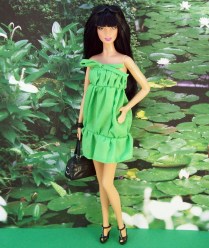Send your question to Umbra!
Dearest Readers,
Spring cleaning time! Here are a few quick and dirty questions that have been lingering in my inbox. Hope this helps — keep ’em coming!
Q. Dear Umbra,
Do you have any suggestions for the best way to get my eyeglass lenses clean?
Monique M.
Plymouth, N.H.
A. Dearest Monique,
I have the perfect eco-solution for you. It is called: Your Breath and a Swipe of Your Shirt. Yes, you will look a bit like your high-school algebra teacher, but it gets the job done. If that doesn’t appeal, might I suggest our old friend white vinegar. Seriously, people, there is nothing white vinegar cannot do. Dab a little on your lenses, wipe with a soft cloth, and enjoy the streak-free shine.
Bifocally,
Umbra
Q. Dear Umbra,
Do Barbie dolls and accessories contain BPA?
Janie
Wayzata, Minn.

Charles RodstromCan’t fool us, Barbie.
A. Dearest Janie,
When I was growing up, a Fisk hound chewed the legs off my favorite Barbie. Did he ingest Bisphenol A along with those deliciously petite feet? I asked the good folks at Mattel, who would say only that the materials they use are “considered safe by the U.S. Consumer Product Safety Commission.” It does appear that Barbies are made from PVC (polyvinyl chloride), which is worrisome. Longtime readers will recall my firm rule — “No on vinyl, and that’s final” — and this overview gives a sense of the global uprising against PVC. A better choice would be to buy or make toys that don’t contain any plastic at all. Healthier for the children in your life, healthier for the planet — and healthier for the occasional overzealous canine.
Skipperly,
Umbra
Q. Dear Umbra,
Is it OK to put broken glass (drinking, window pane, etc) in my recycling container?
Aisha E.
Philadelphia, Penn.
A. Dearest Aisha,
While it goes against my deep urge to recycle absolutely everything, the conventional wisdom is to wrap up broken glass and put it in your trash. This is for two primary reasons: First, glass objects like drinking vessels and window panes are not typically recycled by many municipalities, whether broken or not. (Check with yours to be sure.) Second, even if these objects are recycled in your area, you don’t want to risk slashing the hands of your friendly local hauler.
I will, however, go out on a limb and say if you break a beer bottle and your recycling is picked up by a mechanized truck, you can probably sneak the shards into your bin. Of course, you could always look into reuse too. Need any mosaics?
Craftily,
Umbra
Q. Dear Umbra,
Congratulations on your witty, informative column! I would like to know how to recycle used spiral-bound notebooks. I have about 10 of them waiting for disposal. Please don’t tell me I have to tear out all the paper!
Catherine H.
Mamaroneck, N.Y.
A. Dearest Catherine,
Thank you! And are these notebooks your journals from fourth grade onward? If so, I urge you to keep them. I destroyed mine a decade or so ago, and I sometimes wish I could revisit the woes of young Umbra. The teacher who refused to debate the finer points of roadless rules, the junior-high locker that wasn’t big enough for my unicycle — that sort of thing. But if you’re ready to part with yours, check with your local waste authority to see whether you need to disassemble them. Some recycling plants can handle an intact notebook, others can’t. If separation is required, think of this little project not as “tearing out all the paper” but as simply removing the binding. Once you get started you might find it rather satisfying – and you can even look into creative ways to reuse the metal when you’re done.
Confidentially,
Umbra
Q. Dearest Umbra,
For those of us who get headaches from fragrances, staying in motels and hotels is a real stinky problem. But I recently stayed at a resort where they do not use heavily scented cleaners. My question for you: Is there a website that lists the non-smelly hotels and motels?
Rob C.
Ridgway, Colo.
A. Dearest Rob,
How hotels love their scents. Roses, vanilla, tobacco, old books — these things apparently create “transitional portals” and emotional attachments. Or, in the case of many guests including you, headaches. Happily, I have resources to suggest: Green Vacation Hub offers a clickable map of green hotels that includes a special filter for fragrance and air quality. And the Safer Travel Directory is an old-school list of hundreds of establishments that are sensitive to the needs of the chemically sensitive ($17 PDF, $19-$25 hard copy). At larger hotel chains you can also inquire about allergy-free rooms — some use air purifiers and fragrance-free products that can minimize, if not entirely do away with, your discomfort. Of course, you’ll still have to make it through that old-book-scented lobby.
Vagabondly,
Umbra
Q. Dear Umbra,
How do I get rid of a big-ass tube TV?
Hanna W.
Seattle, Wash.
A. Dearest Hanna,
Do you know how many old TVs are sitting in storage in American homes? A whopping 99 million, according to an EPA estimate [PDF]. That was a few years back, and I bet it’s grown since then. This means — and here I am extrapolating just a tad — that you are not alone in your dilemma. What the heck do we do with old TVs, indeed? We are rightfully hesitant to toss them, because they are full of lead and mercury and other nasties that can contaminate our soil and water (eventually contaminating us). In fact, many places, including your very own King County, will not allow TVs in the trash. Luckily, TV recycling is getting easier and more common, thanks to local recycling centers, programs set up by major retailers such as Best Buy, and electronics manufacturers. Start with EPA’s Electronics Donation and Recycling page and King County’s handy directory, and promise me you won’t stop until you’ve found the beast a proper resting place.
Downtonly,
Umbra




